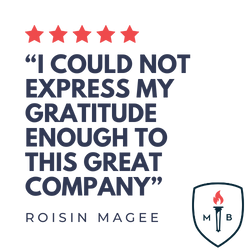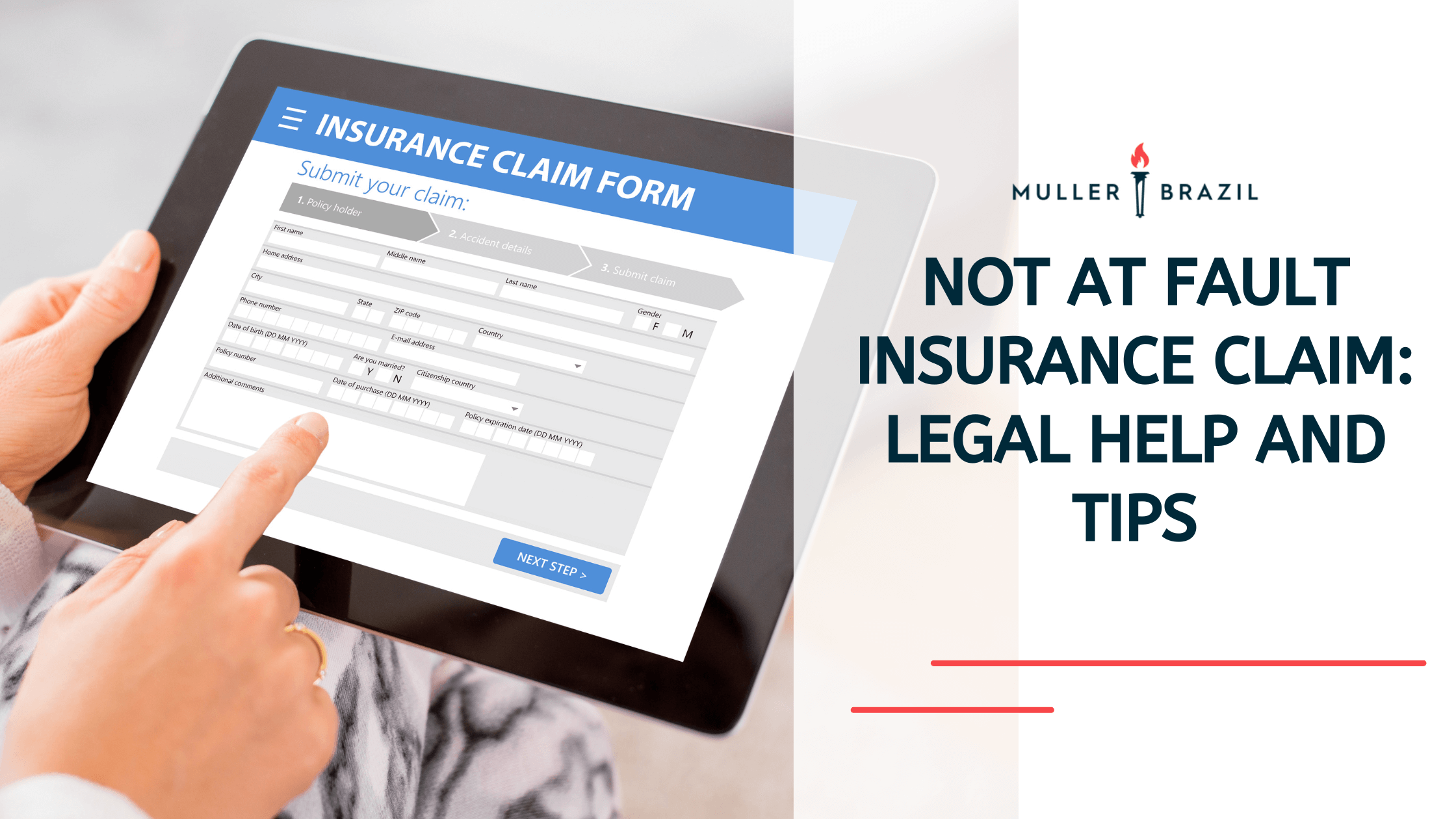7 min read
Not at Fault Insurance Claim: Legal Help and Tips
![]() Maximillian J. Muller, Esquire
Feb 20, 2025 8:11:00 AM
Maximillian J. Muller, Esquire
Feb 20, 2025 8:11:00 AM
A not-at-fault insurance claim ensures the other driver’s insurance covers your medical bills, car repairs, and lost wages, but knowing your rights and submitting proper documentation is key to a successful claim.
Being in a car accident is stressful enough, but when you weren’t the one who caused it, dealing with insurance claims can feel even more frustrating. Who pays for vehicle repairs, medical expenses, and lost wages? How do you deal with the other driver's insurance company? And most importantly, how can you ensure you get the compensation you deserve?
If the accident occurred due to another driver’s negligence, you have legal rights. While insurance companies are supposed to cover damages in a no-fault accident, they often try to minimize payouts. That’s why understanding the process is important, so you don’t get stuck with unexpected bills or unfair delays.
What Should You Do After an Auto Accident That Wasn’t Your Fault?
Being in a car accident is a horrible experience, but taking the right steps at the accident scene can protect your rights and strengthen your insurance claim. Whether it’s a minor fender bender or a serious collision, here’s what you should do:
Remain Calm and Ensure Safety
- Check yourself and any injured parties for physical injuries. If anyone needs immediate medical attention, call 911.
- Move to a safe area if possible, especially if the accident occurred on a busy road.
Gather Important Information
Exchange contact and insurance company details with the other driver. Be sure to get:
- Name, phone number, and address
- License plate number
- Driver’s license information
- Auto insurance policy details, including the other driver's insurance company
- Avoid admitting fault or making statements that could be misinterpreted later.
Take Photos and Document the Scene
- Snap pictures of the damaged vehicle, accident scene, and any visible injuries.
- Capture traffic signs, road conditions, and weather factors that could help determine fault.
- If there are witnesses, get their contact information in case you need their statement.
Seek Medical Treatment
- Even if you feel fine, some injuries - like whiplash or internal damage may not show up right away.
- Keep records of all medical expenses, including hospital visits, prescriptions, and therapy sessions.
Notify Your Own Insurance Company
- Report the car accident to your own insurance company as soon as possible.
- Be honest but stick to the facts. Your insurer may request a recorded statement, but it’s best to consult an attorney before providing one.
Get Help Today
How Does Car Insurance Work When the Accident Was Not Your Fault?
After a car accident, determining who pays for medical expenses, vehicle repairs, and other damages depends on your state’s auto insurance laws and the at-fault driver’s insurance company. Here’s what to expect:
Who Pays for Damages in an At-Fault State?
In states that follow at-fault insurance laws, the driver who caused the accident (and their insurance company) is responsible for covering the damages. This typically includes:
- Medical bills for the injured person
- Vehicle repairs or total loss reimbursement
- Lost wages due to missed work
- Other losses like emotional distress or pain and suffering
The other insurance company may try to reduce their payout by disputing fault or downplaying your injuries. Having an attorney ensures they don’t take advantage of you.
What Happens in a No-Fault State?
If you live in a no-fault state, like Pennsylvania, your own insurance company will cover certain damages, regardless of who was responsible for the collision. Under no-fault insurance requirements, your own policy typically pays for:
- Medical treatment and medical expenses
- A portion of lost wages
- Necessary rehabilitation costs
However, no-fault coverage does not pay for vehicle repairs or non-economic damages like pain and suffering. In these cases, you may need to file a third-party claim with the at-fault driver’s insurance company.
Can Your Own Insurance Help If the Other Driver Is Uninsured?
If the other driver doesn’t have insurance coverage, you may need to rely on your own policy. Options include:
- Uninsured motorist coverage (UM) – Pays for medical bills, lost wages, and damages if the at-fault driver has no auto insurance.
- Collision coverage – Covers vehicle repairs, regardless of fault, but may require you to pay a deductible upfront.
What If the At-Fault Driver’s Insurance Company Delays or Denies Your Claim?
The other driver’s insurance company may try to:
- Dispute who was at fault
- Offer a low settlement that doesn’t cover all damages
- Delay processing the insurance claim
If this happens, you don’t have to accept an unfair outcome. An attorney can handle negotiations and make sure that you get the payment you’re entitled to, whether through settlement or legal action.
Contact Us Now
What’s the Difference Between No-Fault and At-Fault Insurance?
Understanding the difference between no-fault insurance and at-fault insurance is important when filing an insurance claim. Your state’s laws determine how medical expenses, vehicle repairs, and other damages are handled after a car accident.
How Does No-Fault Insurance Work?
In no-fault states, drivers must file a claim with their own insurance company, regardless of who caused the accident. This coverage, known as Personal Injury Protection (PIP), typically pays for:
- Medical bills for the injured person
- Lost wages if the accident prevents them from working
- Certain essential expenses related to recovery
However, no-fault insurance does not cover property damage, pain and suffering, or other non-economic losses. If your injuries meet the state's injury threshold, you may be able to pursue a personal injury claim against the at-fault driver.
How Does At-Fault Insurance Work?
In at-fault states, the at-fault driver’s insurance company is responsible for covering damages. The injured party can file a third-party claim with the other insurance company for:
- Medical treatment and related expenses
- Vehicle repairs or reimbursement for a total loss
- Lost wages
- Compensation for emotional distress or permanent disfigurement
Drivers in at-fault states are required to carry minimum liability insurance coverage, but it may not always be enough to cover all damages. In these cases, an injured person may need to file a lawsuit to seek additional compensation.
Can You Sue in a No-Fault State?
In no-fault states, you can only file a lawsuit if your physical injuries exceed the state’s injury threshold. This varies by state but typically includes:
- Permanent disability or disfigurement
- Significant medical costs beyond what no-fault insurance covers
- Long-term impairment preventing work
How Can You Build a Strong Case After a No-Fault Accident?
Even in a no-fault accident, gathering solid evidence is necessary to ensure your insurance claim is processed smoothly and fairly. While your own insurance company will handle much of the claim process, documenting every aspect of the car accident strengthens your position, especially if you need to file a third-party claim or pursue legal action.
Start With the Right Evidence
From the moment the accident occurred, collecting detailed evidence is important. If you are physically able, take photos of the accident scene, including:
- The position of vehicles before they are moved
- Any visible damage to your vehicle and the other driver’s
- Traffic signs, signals, or road conditions that may have contributed to the collision
Eyewitness testimony can also be valuable. If bystanders saw what happened, ask for their contact information. Their statements may support your case if the other driver's insurance company disputes your claim.
Keep Track of Medical Treatment and Expenses
Even if your injuries seem minor, seek medical attention immediately after a car crash. Some physical injuries, like whiplash or concussions, don’t show symptoms right away but can worsen over time. Keeping records of all medical expenses, including doctor visits, prescriptions, and rehabilitation costs, helps document the extent of your injuries.
Additionally, if the accident has caused lost wages due to missed work, keep a log of your hours and provide any necessary documentation from your employer. This ensures you are reimbursed for any income lost during recovery.
Monitor All Communication With Insurance Companies
Dealing with an insurance company after an auto accident can be challenging. Adjusters may try to downplay damages or rush a low settlement offer. Be cautious in your communications:
- Stick to the facts when speaking to the other insurance company
- Do not agree to a recorded statement without consulting an attorney
- Keep copies of all emails, letters, and claim-related documents
How Do You File a Claim With the At-Fault Driver’s Insurance Company?
If another driver caused the car accident, their insurance company is responsible for covering your damages. Filing a third-party claim requires careful documentation and persistence.
- Report the Accident: Contact the at-fault driver’s insurance company with details of the accident scene, police report (if available), and any photos or witness statements.
- Submit Documentation: Provide medical bills, proof of medical treatment, repair estimates, and other evidence to support your insurance claim.
- Be Ready to Negotiate: Insurers may undervalue damages, dispute injuries, or delay payment. Do not accept a low settlement without reviewing your options.
- Know Your Rights if Denied: If the insurance company refuses your claim, you can appeal, provide further evidence, or pursue a personal injury claim if damages meet legal thresholds.
How Can You Protect Your Rights as a Not-At-Fault Driver?
Even when you’re not responsible for the car crash, insurance companies may attempt to minimize payouts. Here’s how to protect yourself:
- Understand Your Policy: Review your own insurance company’s coverage, including uninsured motorist protection.
- Keep Documentation: Record all expenses, medical bills, and repair costs related to the accident.
- Be Cautious With Insurers: The other driver's insurance company may try to shift fault or downplay damages, do not agree to any settlement without reviewing it first.
When Is It Time to Get Legal Help?
While some car accident claims resolve quickly, others become complicated when insurance companies delay payments, dispute fault, or offer unfair settlements. If you’re facing any of the following issues, it may be time to seek legal representation:
- The at-fault driver’s insurance company is refusing to pay for medical expenses, vehicle repairs, or other damages.
- Your claim is being delayed without explanation, leaving you without coverage or reimbursement.
- The insurer undervalues your damaged vehicle or disputes the necessity of your medical treatment.
- You suffered serious injuries, such as permanent disfigurement or long-term disabilities, requiring more than basic insurance coverage.
- The other insurance company is pushing you to accept a low settlement that doesn’t cover all your losses.
In these cases, having an attorney can level the playing field. At Muller Brazil, we negotiate aggressively with insurance companies, gather expert evidence, and ensure you receive the full compensation you deserve.
Contact Muller Brazil Today for a Free Consultation
Dealing with an insurance claim after a car accident can be overwhelming, especially when the at-fault driver’s insurance company isn’t cooperating. You don’t have to handle it alone.
At Muller Brazil, we help injured parties manage insurance claims, fight for fair compensation, and take legal action when necessary. If you’re struggling to get the insurance coverage you deserve, we’re here to help.
Meet the Author
Max Muller - Founding Partner
Maximillian J. Muller is a founding member of Muller Brazil and My Vaccine Lawyer. Mr. Muller is an experienced litigator in both Federal and State Courts in the areas of vaccine injury, unsafe drug and medical device injury, personal injury, mass torts, and bad faith. Mr. Muller prides himself on keeping Muller Brazil on the cutting edge of injury litigation and running a client-focused practice.
Learn more about Max Muller ⇒





